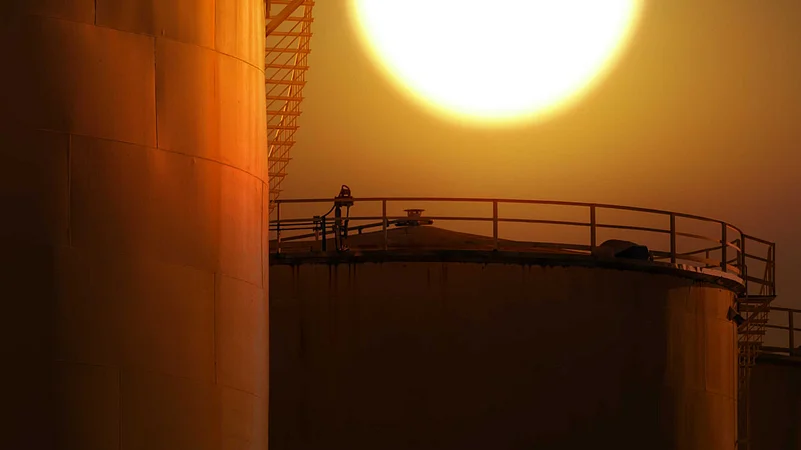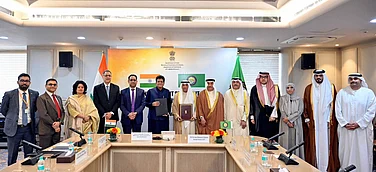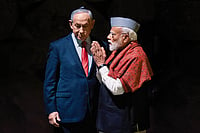India’s latest venture in Sri Lanka – modernising the Trincomalee oil tank farm – may be facing massive headwinds, as the ultra-nationalist Janatha Vimukthi Perumuna, commonly known as JVP, plans to oppose what it perceives as Delhi’s "expansionist’" move. India might be utilising this opportunity to set up its permanent presence on the island nation.
India’s interest in the Trincomalee oil tank farm is not new. It has been in the works since the 1987 India-Sri Lanka agreement but never got off the ground till now. These old tanks, built by the British during World War-II, were part of the war effort to ensure the storage of oil. But since then, they had fallen into disuse and currently require major renovation to get the storage tanks working.
It would be a good place to store India’s petroleum reserves in the renovated tanks which are close to the Trincomalee harbour in Sri Lanka’s eastern province. More so at a time, when maritime security is on top of the agenda as China’s naval presence in the Indian Ocean has increased by leaps and bounds.
According to the agreement, 14 of the tanks will be for India’s use, while 24 are reserved for Sri Lanka. Moreover, 61 tanks will be jointly developed, where India can own 49 per cent of the stakes. The agreement is valid till 2072, according to reports in the Sri Lankan media. No details have been released here.
The JVP has asked the people of the country, civil society as well as religious organisations to join its efforts to ensure that the deal is stopped.
At one time, the JVP was a Marxist-Leninist Party committed to overthrowing the elected government violently. It was founded in 1965 by Rohana Wijeweera at a time when Communist ideology was strong. Those were the days when slogans like --- 'political power grows out of the barrel of a gun' -- were popular. But it soon degenerated into a Sinhala chauvinist ultra-nationalist group. It has since renounced violence and takes part in elections. It also has a number of members in the Lankan Parliament now.
In a news conference, that was held soon after the agreement was signed in January this year, the JVP accused India of trying to take over the island’s strategic assets and promised to ensure that Sri Lanka’s national interests were not compromised by the government of Gotabaya Rajapaksa.
“We have no problem with Indian people. We do not deny the fact that the two nations have millennia-long links. We have had diplomatic relations and cultural links with India since time immemorial. Yet we cannot let the Indian government’s plans to capture Trinco oil tank farm and allow it to succeed its expansionist plans,” JVP Politburo Member and former MP Sunil Handunnetti was quoted by the local press as saying.
He went on to say that President Rajapaksa’s government was "compelled to sign this agreement’’ by India much like his predecessor JR Jayawardene. “It is Déjà vu of the Indo-Lanka agreement which was pushed down the throat of Lanka on July 29, 1987. India got the JR Jayewardene government to sign the agreement by coercion. They dropped ‘parippu’ here, violating our air space. They sent an army of 150,000 while Sri Lanka’s army had only 72,000 cadre strength. This time they have used economic means for the coercion,’’ the former MP said. The reference to "parippu" dates back to Rajiv Gandhi’s government when he had sent the Indian air force to drop food parcels in the northern province, home to the Tamil minority of the island. Colombo had stopped essential supplies to the Jaffna region to punish civilians for supporting the Liberation Tigers of Tamil Eelam (LTTE).
Whether this is a mere threat or would expand into a people’s movement is hard to say at the moment. But the fact remains that many Sinhala-Buddhists cannot forget that New Delhi had always supported the rights of Tamil minorities.
It is also true, that a trilateral India-Japan-Sri Lanka plan to develop the Colombo Port’s Eastern Container Terminal (ECT) was scrapped in 2019. Rajapaksa said that the Indian firm involved in the project refused to agree to its new terms. Workers had also resisted the plan. To appease India and Japan, Colombo announced the West Container Terminal (WCT) at the Colombo Port, which would be given to the two countries.
Whether the strategic oil tank farm agreement will face the same issue remains to be seen. But the JVP is set to lead the movement to scrap the deal.























